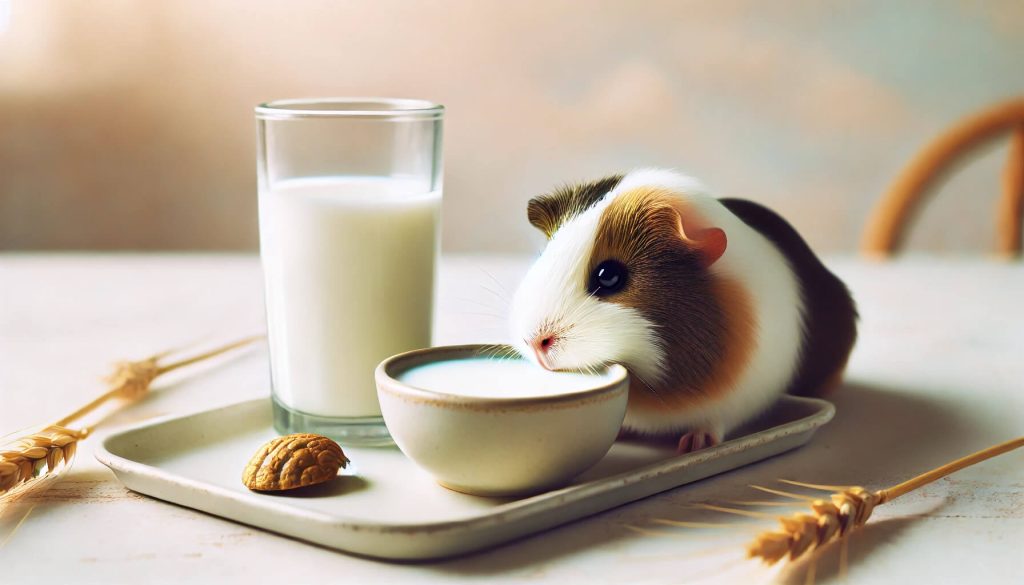
Can Guinea Pigs Drink Milk?
Understanding Guinea Pig Dietary Needs
Knowing what guinea pigs eat helps ensure their health and well-being. Their dietary needs differ from other pets and must be carefully considered.
What Do Guinea Pigs Normally Eat?
Guinea pigs primarily eat hay, fresh vegetables, and specially formulated pellets. Hay (such as Timothy hay) provides essential fiber for their digestive health. Fresh vegetables like bell peppers, carrots, and leafy greens supply necessary vitamins and minerals. Pellets designed for guinea pigs contain balanced nutrients, supporting their overall health. Additionally, guinea pigs need a constant supply of vitamin C, which can be found in vegetables such as kale and cilantro.
The Role of Water in Their Diet
Water is a crucial component of a guinea pig’s diet. Fresh, clean water should always be available to prevent dehydration and maintain bodily functions. Unlike some animals, guinea pigs cannot tolerate dietary changes well. Adding substances like milk to their diet can upset their digestive system, leading to severe health issues. Ensure water is provided in a bottle and changed daily for optimal health.
Can Guinea Pigs Drink Milk?
Guinea pigs should not drink milk. Their digestive systems lack the necessary enzymes to process dairy products effectively.
Potential Health Risks of Milk
Giving milk to guinea pigs poses significant health risks. Lactose causes digestive issues since guinea pigs do not produce lactase, the enzyme essential for lactose digestion. Symptoms include diarrhea, bloating, and stomach pain. These conditions lead to dehydration and more severe issues if not addressed swiftly.
Milk also introduces the risk of respiratory infections. High-fat and protein content in milk increases mucus production, leading to respiratory complications. Overall, milk disrupts guinea pigs’ delicate digestive balance and poses unnecessary health hazards.
Nutritional Implications for Guinea Pigs
Milk does not meet the nutritional needs of guinea pigs. Their diet requires high fiber, vitamin C, and low-fat content. Hay and vegetables supply vital nutrients. Milk, with its high sugar and fat levels, lacks the dietary fiber essential for their health.
Guinea pigs’ bodies do not require dairy calcium. Instead, they get calcium from vegetables like kale and bell peppers. Including milk in their diet means depriving them of necessary nutrients and exposing them to harmful substances. Always opt for safe, nutritious alternatives that align with their dietary requirements.
Safe Alternatives to Milk for Guinea Pigs
Guinea pigs can’t digest dairy products, but numerous safe alternatives meet their nutritional needs effectively.
Suitable Treats and Supplements
Guinea pigs enjoy a variety of treats and supplements that are both tasty and beneficial:
- Vegetables: Carrots, bell peppers, and cucumbers provide hydration and vitamins.
- Fruits: Apples (without seeds) and berries give a natural, sweet flavor and essential nutrients. Offer in moderation.
- Vitamin C Tablets: Ensure guinea pigs get enough vitamin C to prevent scurvy, a common deficiency.
- Herbs: Parsley, cilantro, and dill can be added to their diet for a change of taste and added nutrition.
Importance of Balanced Diet
A balanced diet is vital for the health of guinea pigs:
- Hay: Timely hay should be the primary component, providing necessary fiber for digestion.
- Pellets: Specialized guinea pig pellets include fortified nutrients and vitamin C, ensuring a balanced intake.
- Water: Fresh, clean water should always be available, as hydration is crucial.
Choose foods that align with their dietary needs. Avoid high-fat and sugary foods, which can lead to health issues. Keeping their diet varied yet focused on nutritional balance promotes overall well-being.
Conclusion
Understanding your guinea pig’s dietary needs are crucial for their health and well-being. Avoid giving them milk and focus on providing a balanced diet rich in fiber and vitamin C. Opt for safe alternatives like vegetables, fruits, and vitamin C tablets as treats and supplements. Stick to hay, specialized pellets, and fresh water to ensure your guinea pig thrives. By steering clear of high-fat and sugary foods, you’ll promote a healthy, varied diet that keeps your furry friend happy and healthy.
